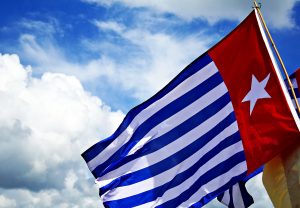Earlier this week, United Nations human rights experts issued a statement decrying the Indonesian state’s abuses against indigenous residents of the country’s Papua region, where the security situation has deteriorated markedly over the past year.
In the statement, three independent U.N. experts said that between April and November of last year, they received reports indicating several instances of extrajudicial killings, including of young children, enforced disappearances, torture, and the enforced displacement of at least 5,000 Papuans. It added that “urgent action is needed to end ongoing human rights violations against indigenous Papuans.”
Indonesia’s Papua and West Papua provinces, which form the western half of the island of New Guinea, have seen a simmering separatist conflict since Papua was incorporated into Indonesia in a flawed referendum in 1969. The Indonesian state’s attempts to quash the insurgency led by the Free Papua Movement (Organisasi Papua Merdeka, or OPM) has for years resulted in extrajudicial killings, arbitrary arrests, restrictions on movement and freedom of expression, and even drawn accusations of genocide.
The security situation in the highland regions of Papua has further deteriorated since April of last year, when separatist rebels belonging to the West Papua National Liberation Army successfully ambushed and assassinated Brig. Gen. Gusti Putu Danny Nugraha, the head of Indonesia’s intelligence agency in the eastern province.
The killing led the government to formally designate Papuan separatists as “terrorists” and pour additional troops into remote highland regions of Papua and West Papua provinces. Then, in July, protests took place across Papua after the Indonesian government renewed and amended a Special Autonomy Law that local activists say will increase Jakarta’s grip over the resource-rich region.
The past year’s unrest has resulted in deaths on both sides, dozens of arrests, and the mass displacement of Papuan villagers caught in the middle of the conflict. The experts claimed that an estimated 60,000 to 100,000 people had been internally displaced in Papua since an escalation of violence that began in December 2018, when separatist fighters killed 16 laborers working on the Trans-Papua highway, which marked an escalation of the long-running conflict.
According to U.N. experts, Francisco Cali Tzay, Morris Tidball-Binz, and Cecilia Jimenez-Damary, the majority of those displaced in West Papua “have not returned to their homes due to the heavy security force presence and ongoing armed clashes in the conflict areas.” It added, “Thousands of displaced villagers have fled to the forests where they are exposed to the harsh climate in the highlands without access to food, healthcare, and education facilities.”
The experts’ statement also cited the example of two children, aged 2 and 6, who were shot on October 26 when bullets flew into their homes during a firefight. The 2-year-old died later, though according to a Reuters report, separatists and security forces have offered differing accounts of the incident.
These sorts of statements are issued frequently by the U.N.’s teams of human rights analysts, without making an appreciable impact on the Indonesian government. Indeed, the statement noted that U.N. officials have written to the Indonesian Government on a dozen occasions since the killings on the Trans-Papua highway.
Sure enough, Indonesia’s mission to the U.N. responded by issuing a statement of its own saying that it “deeply regrets the biased news release issued by the so-called ‘U.N. Human Rights experts’.” It denied that the authorities had carried out forced displacements and said people had been displaced by a number of issues, “ranging from national disasters, homes being rampaged by armed criminal groups, tribal conflicts, and conflicts stemming from the results of regional elections.”

































